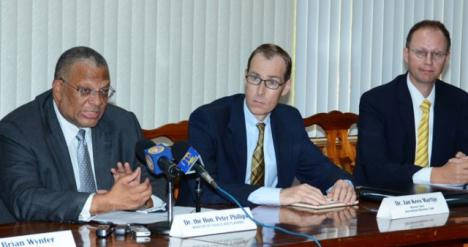
Jamaica remains on course for IMF drawdown

Kingston, Jamaica (JIS) — Jamaica remains on course for a second drawdown of funds from the International Monetary Fund (IMF), and supporting financial inflows from the World Bank and Inter-American Development (IDB), totalling some US$300 million.
According to head of the IMF staff mission team to Jamaica, Jan Kees Martijn, and finance and planning minister, Dr Peter Phillips, this is based on the country’s positive performance under the government’s economic reform programme for the second quarter of the fiscal year, between July and September, which recorded economic growth of just under one per cent.
Martijn advised that approval of the staff mission team’s second quarterly economic review report for Jamaica, under the four-year extended fund facility (EFF) by the IMF’s management and executive board, will qualify the country for a second drawdown totalling some US$30 million.
Phillips also said that this would pave the way for complementary funding support totalling US$270 million from the World Bank and IDB.
Both Phillips and Martijn were speaking at a media briefing, held at the Ministry’s offices in Kingston on Wednesday, where journalists were updated on the results of the staff mission team’s second quarterly economic review for Jamaica, conducted over last week.
Martijn, who advised that the team met with a wide cross section of private and public stakeholders over the seven-day period, commencing November 6, said the discussions were “excellent,” and focused on Jamaica’s economic performance under the programme and the policies for 2013/14, as well as the remainder of the programme period.
“The execution of the 2013/14 budget has been broadly on track and, more generally, overall policy implementation under the programme, has been strong. All quantitative and indicative targets for the end of September were met, including the floor on social spending. All structural benchmarks, to date, have also been met in a timely manner, although with some delay in the tabling of the fiscal incentives legislation,” he outlined.
The IMF mission head disclosed that “preliminary understandings” were also reached with the government on a set of economic policies detailed in an “updated” letter of intent.
Key elements of the updated programme, Martijn disclosed, include: implementation of the next phase of tax reform designed to increase support for economic growth, and facilitate employment creation; establishment of a “binding” rule to enhance fiscal transparency and lock in the gains from fiscal consolidation achieved to date; further reforms of the financial system to strengthen it, particularly in relation the legal and regulatory framework applicable to the securities sector; strengthening the social protection framework, and enhanced efforts to move recipients from welfare to work.
There will also be measures to promote economic growth through an improved business climate and competitiveness; and pursuing strategic investments.
These policies, Martijn indicated, are “bolstered” by important support from the World Bank and IDB. The plans, he outlined, include, among other things, better targeting and management of public investments; projects to reduce the cost of electricity; reforms to enhance access to credit, and to make the labour market more flexible.
“The preliminary understandings that we have reached on the programme are subject, as always, to approval by the IMF’s management and executive board. And, provided that (economic) performance remains strong, consideration of the programme by the IMF’s board, could take place by December,” Martijn said, while expressing gratitude for the level of co-operation extended by all stakeholders with whom the mission team met.
Meanwhile, Phillips advised that the legislative agenda to be pursued over the next 12 months include: the fiscal reform legislation, currently before Parliament, which is expected to be debated this month; the Secured Interest in Personal Property Bill, which will facilitate access to credit by persons using their assets as collateral, which is also before Parliament; increased financing for micro, small and medium size enterprises (MSMEs) through the Development Bank of Jamaica (DBJ); flexible work arrangements geared at enhancing productivity; and legal and regulatory reforms conducive to collective investment schemes.
“We intend to continue to build on the progress that has been made thus far to reform the country’s finances and we will endeavour to ensure that as many Jamaicans as possible, are able to participate in this effort to secure growth, reform our economy, and deliver on the legitimate aspirations of the Jamaican people. Now that the early shoots of economic growth are visible, it is incumbent on us to nurture them and to advance their growth to the fullest extent possible,” the finance minister said.
Phillips thanked the mission team for their work in concluding the second quarterly review, as well as the stakeholders who made key inputs in this undertaking.
